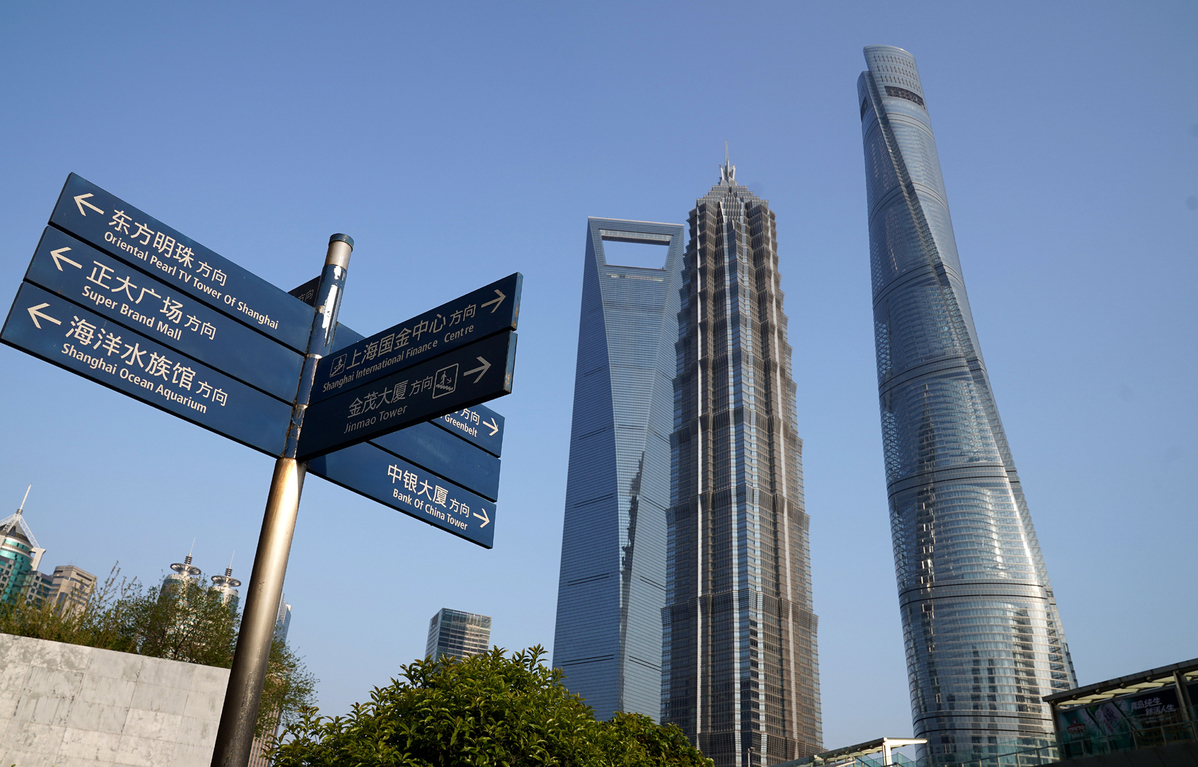
The Lujiazui financial hub in Shanghai's Pudong New Area is seen in this photo. [Photo/Xinhua]
China is strongly dissatisfied and has lodged solemn protests with the United States after Washington issued the latest restrictions on the two countries' two-way investment.
Washington's tightening of security reviews targeting Chinese investment in the US "is a serious blow to the confidence of Chinese enterprises in investing in the US", and the restrictions will only damage the US' own business environment, Foreign Ministry spokesman Lin Jian said at a daily news conference on Monday.
China's business community also strongly opposes the latest restrictions on two-way investment, warning that the measures will hinder economic and trade exchanges between industries in the two countries, according to the nation's top foreign trade and investment promotion agency.
The restrictions are listed in the "America First Investment Policy", which was signed on Friday by US President Donald Trump. The policy aims to tighten security reviews and specifically targets investment from China, while also imposing further restrictions on US companies' investment in China.
Imposing restrictions on US investment in China is a deliberate intervention in the independent decision-making of US companies and distorts the investment exchanges between the two countries, Foreign Ministry spokesman Lin said.
"By shutting out Chinese companies and the Chinese market, the US will end up hurting its own economic interests and international credibility," he said.
Beijing urges Washington to "abide by international investment and trade rules, respect the laws of market economy, stop politicizing and weaponizing economic and trade issues, and stop undermining China's legitimate right to development", Lin added.
Furthermore, he said, China "will take necessary measures to resolutely safeguard its legitimate rights and interests".
Chinese businesses firmly reject Washington's repeated broadening of the concept of "national security", a spokesperson for the Beijing-based China Council for the Promotion of International Trade said in an online statement on Monday.
The US move will severely undermine the international economic and trade order, and will disrupt the security and stability of global industrial and supply chains, the statement said.
It also noted that the US is using investment security reviews and other regulatory measures to restrict Chinese enterprises' investment in sectors such as technology, critical infrastructure, healthcare, agriculture, energy and raw materials.
Furthermore, the US continues to expand restrictions on outbound US investment in China through economic sanctions, financial audits and other methods, further broadening the scope of restricted industries, investment types and funding sources, the statement added.
Gao Lingyun, a researcher at the Chinese Academy of Social Sciences' Institute of World Economics and Politics in Beijing, said that with the US adopting an increasingly broad definition of national security, Chinese investors will encounter significant compliance pressures in emerging technology sectors, and ambiguities in policy scope may further heighten uncertainty.
Amid growing investment restrictions from the US and geopolitical tensions in other parts of the world, China issued an action plan last week to stabilize foreign investment in 2025.
The country will support foreign companies' participation in China's new industrialization, with a focus on high-tech fields. They are also welcome in services sectors such as elderly care, culture and tourism, sports, healthcare, vocational education and finance.
Jens Eskelund, president of the European Union Chamber of Commerce in China, said the chamber takes the action plan as a continuation of China's ongoing efforts to improve the business climate for foreign investors.
"We are looking forward to seeing this policy implemented in a way that delivers tangible benefits for our members," Eskelund said.
Zhao Jie, public affairs director for China at Decathlon, a French sports equipment and sportswear manufacturer and retailer, said the action plan will support the company's long-term expansion in the Chinese market. Decathlon plans to expand its number of stores in China over the next three years, with an expected growth of 10 to 20 new locations, further strengthening its market presence, Zhao said.
Sally Loh, president for China at Otis Worldwide Corp, a US elevator manufacturer, highlighted that China's latest policies, coupled with its ongoing focus on urban renewal, digital transformation and smart city development, provide a highly conducive environment for multinational corporations.
"We will continue to drive digitalization and harness artificial intelligence solutions across product development, services and operations within the country," she said.
China attracted 97.59 billion yuan ($13.46 billion) in foreign direct investment in January, marking a 27.5 percent increase from the previous month but a 13.4 percent year-on-year decline, data from the Ministry of Commerce shows.
As China continues to push for a more open and stable investment environment, it is also actively engaging with global business communities to enrich economic and trade ties.
For example, a business delegation led by the China Council for the Promotion of International Trade left China on Monday for a three-day visit to Germany.
The delegation consists of representatives from nearly 30 companies and industry associations, covering industries such as finance, transportation, agriculture, automotive and machinery manufacturing. Its members will meet with senior executives of leading German companies including Bosch, BMW, Mercedes-Benz and Wacker Chemie, the CCPIT said in another statement.